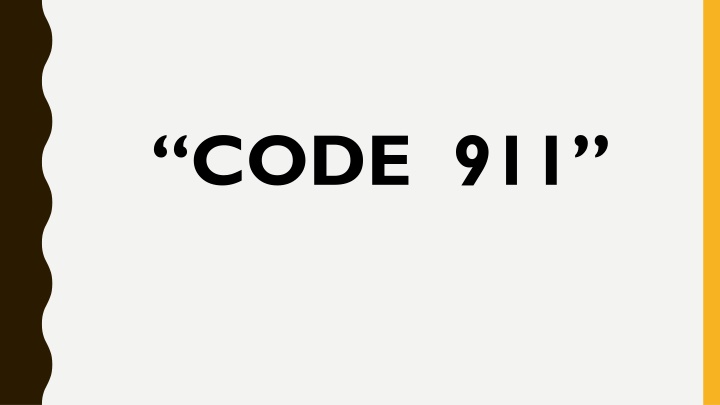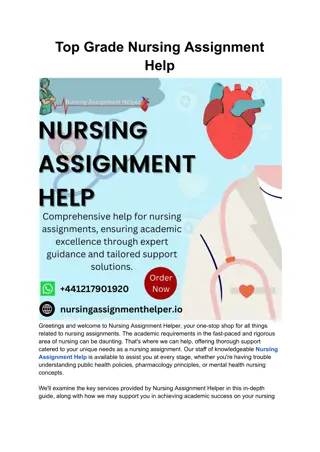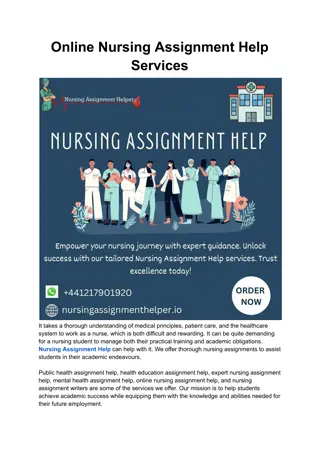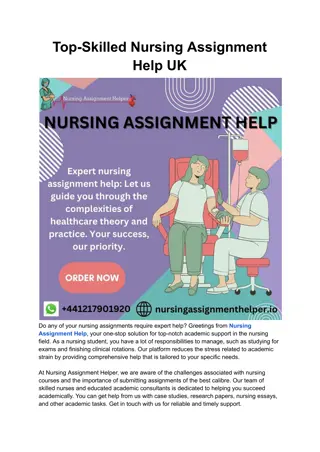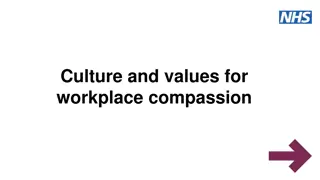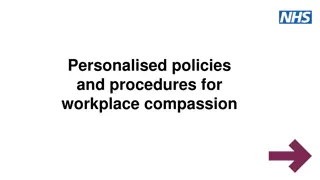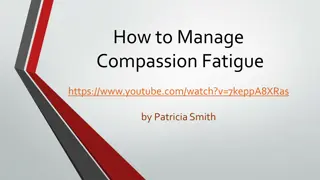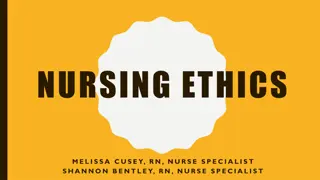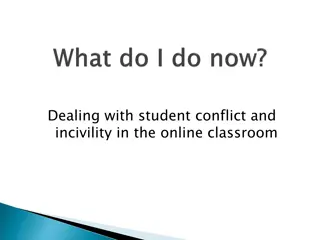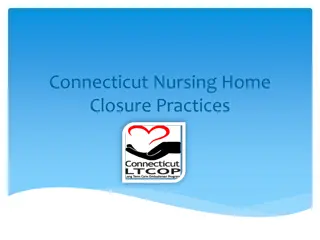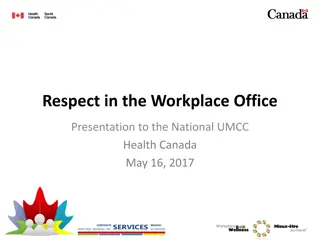Addressing Incivility in Nursing: A Call for Respect and Compassion
Explore the prevalence of incivility in nursing through insightful statistics and images, shedding light on the challenges faced by new grads and experienced nurses alike. Learn about the harmful effects of behaviors like lateral violence and bullying, and the importance of promoting civility in healthcare settings. Special thanks to key figures dedicated to tackling this issue and promoting a culture of respect and professionalism in nursing.
Download Presentation

Please find below an Image/Link to download the presentation.
The content on the website is provided AS IS for your information and personal use only. It may not be sold, licensed, or shared on other websites without obtaining consent from the author.If you encounter any issues during the download, it is possible that the publisher has removed the file from their server.
You are allowed to download the files provided on this website for personal or commercial use, subject to the condition that they are used lawfully. All files are the property of their respective owners.
The content on the website is provided AS IS for your information and personal use only. It may not be sold, licensed, or shared on other websites without obtaining consent from the author.
E N D
Presentation Transcript
96% of all nurses have had it, or have witnessed it
60% of New Grads leave their first job within 6 months because of it
Nursing, the profession of caring and compassion, a higher calling, the #1 most trusted profession And we eat our young??
INCIVILITY IN NURSING S H E R R I C O Z Z E N S M AY 2 0 2 0 C O P Y R I G H T E D
SPECIAL THANKS TO: Keith Rischer, MA, RN, CEN, CCRN - otherwise known as (the one and only) KeithRN of KeithRN.com Renee Thompson, RN, DNP; healthyworkforceinstitute.com Cynthia Clark, RN, PhD, ANEF, FAAN; Founder of Civility Matters. For their attention to this issue, their commitment to address it, and their willingness to spread the word and share their work.
INCIVILITY IN NURSING Other names for it include: Lateral Violence Horizontal Violence Nurse to Nurse Aggression Bullying Relational Aggression Professional Terrorism No matter what you call it, it is not OK!
BUT FIRST! CIVILITY IS Civility is an authentic respect for others requiring time, presence, a willingness to engage in genuine discourse, and an intention to seek common ground ~Cynthia Clark
INCIVILITY Disregard for others that creates an atmosphere of disrespect, conflict, and stress Rude behavior that results in emotional distress Behavior with ambiguous intent to harm the target, in violation of workplace norms for mutual respect. Characteristically rude and discourteous, displaying a lack of regard for others
BULLYING Consistent pattern of inappropriate, abusive or aggressive behavior toward another person that is designed to intimidate, diminish, devalue, and disrespect Escalation of incivility
EXAMPLES OF UNCIVIL BEHAVIORS Eye rolling Bullying Back-stabbing Gossiping Favoritism Persistent criticism Scapegoating Rudeness, offensive remarks Verbal affront Undermining Non-verbal innuendo Lack of collegial respect Excluding/marginalizing others (cliques) Being unapproachable Sabotage/setting up for failure Broken confidences Faultfinding Unfair assignments Yelling Others
WHY DOES IT HAPPEN? Possible causes include: Burnout Bad day Unhappy Troubles at home Tired Forgot what it s like to be a student/new grad Overworked It happened to me Feeling lack of control of own life Other possibilities
WHY DOES IT HAPPEN? Theory of oppression Born out of the construct of nurses being part of an oppressed population The manifestation of conflict is seen in the context of being excluded from the power structure "It is contended that because nurses are dominated (and by implication, oppressed) by a patriarchal system headed by doctors, administrators and marginalized nurse managers, nurses lower down the hierarchy of power resort to aggression among themselves" (Farrell, 1997. p. 482).
WHO IS AT RISK? Healthcare occupations have the highest rates of incivility
WHO IS AT HIGHEST RISK? Student Nurses New Grads Nurses who are new to the unit Ethnic minorities Gender minorities
HOW DOES IT AFFECT THE NEW NURSE? Crying Despair Fear Shame Anxiety Sleeplessness Stress Low self-worth, self-esteem Job conflict/lack of satisfaction Depression Emotional distress Somatic illness Errors and secondary victim syndrome Robs nurse of joy PTSD Suicide
HOW DOES IT AFFECT PATIENT CARE? Nurses who feel powerless are less likely to seek help & advice from coworkers Nurses who are fearful of being bullied are afraid to ask questions Disruptive behaviors lead to: potentially preventable errors adverse events and outcomes compromises in patient safety and quality patient mortality Lower rates of nurse retention Lower patient satisfaction
WHAT IF I WITNESS BULLYING? Lead by example Treat everyone with respect Role model professional communication Do your share of the work Don t gossip or talk about others Work cooperatively Leave the situation. Just walk away Be positive Reach out to the bullied nurse Speak up for the one not in the room Speak to the bully in private, using learned techniques Don t criticize publicly Keep confidences, promises Help others
IM BEING BULLIED..WHAT DO I DO? HOW DO I STOP IT? You basically call them on it! Use evidence-based approaches You must stand up and give them an assertive response Learning approaches to address incivility equips nurses with the skills to respond to situations and protect themselves and their patients Several possible approaches, including: Cognitive Rehearsal CUS Model Heart-Head-Heart Model Caring Feedback Model Casperson s Framework Others
COGNITIVE REHEARSAL Technique that provides a proactive strategy for nurses to take a stand against incivility and bullying in the workplace. One way to mentally prepare yourself to address threats from incivility or bullying. Allows you to prepare to respond to unprofessional behavior in a manner that s not construed as retaliatory Promotes communication and respect
COGNITIVE REHEARSAL COGNITIVE REHEARSAL Rather than responding immediately or emotionally to unprofessional remarks or behavior, you hold and process them, which allows you to think about the potential situation and what the most appropriate responses might be most appropriate responses might be Memorizing responses is designed to prevent acting impulsively Using a planned, rehearsed response, you acknowledge the situation and create an opportunity to communicate expectations for appropriate behaviors and future interactions Rather than responding immediately or emotionally to unprofessional remarks or behavior, you hold and process them, which allows you to think about the potential situation and what the Memorizing responses is designed to prevent acting impulsively Using a planned, rehearsed response, you acknowledge the situation and create an opportunity to communicate expectations for appropriate behaviors and future interactions
COGNITIVE REHEARSAL Here s how: 1. Pause and process what just happened 2. Identify the uncivil behavior 3. Formulate and respond with a pre-prepared, rehearsed statement 1. Do it after you ve had time to process, but must be the same shift! 2. Do it in private This is a skill that must be practiced!
COGNITIVE REHEARSAL It appears by the way you responded to my request for help that you have something you would like to say to me. Please communicate directly with me. Might be used for: Eye rolling Sighing Throwing hands up Making a face Refusal to help Negative statement about your abilities
COGNITIVE REHEARSAL I would not have asked for help unless I really needed it. Things go so much better for both the patients and each other when we work together. I will gladly return the favor when you need it. Might be used for: Reticence or refusal to help Negative statement about your needing help
COGNITIVE REHEARSAL I feel devalued and disrespected by what you shared openly in front of my patient (or colleague). If you have a concern about my abilities as a new nurse, please share those concerns with me directly and in private, not in front of my patients (or colleagues). Might be used for: Verbal affront Gossiping Broken confidence Insults
COGNITIVE REHEARSAL It appears by the way you re looking at me you have something to say. It s OK to speak to me directly Might be used for: Dirty looks Eye rolling Making faces
COGNITIVE REHEARSAL I called (or asked) because I had a concern about the patient. Your tone of voice is needlessly harsh and I don t deserve to be treated like that. Might be used for: Angry provider Phone call to another department Sarcastic remark about your knowledge base, or question you asked during report
COGNITIVE REHEARSAL It sounds like this is really bothering you. Have you talked to Susie about it? Might be used for: Gossiping about another nurse Backstabbing Scapegoating
COGNITIVE REHEARSAL I don t talk about people when they are not here to advocate or respond for themselves. Please stop. Might be used for: Gossiping about another nurse Backstabbing Scapegoating Excluding/marginalizing others
LETS PRACTICE Situation: You are giving report to a seasoned nurse. She does not look at you, is not writing anything down, is tapping her foot, and she keeps fidgeting and looking at her watch. (from KeithRN)
LETS PRACTICE Situation: You are preparing to insert your first NG tube and are a little nervous. You ask a fellow nurse to come with you for moral support and assistance if you need it. The nurse rolls her eyes, sighs, and stomps into the room with you. Once there, she says to the patient, Your nurse is a newbie and has never inserted an NG tube. I m here to make sure she does it right! (from KeithRN)
LETS PRACTICE Situation: It is the end of your third shift off orientation. You were able to complete all of your patient care except to change a central line dressing and finish documenting. When you report off, you mention that the dressing still needs to be changed. The oncoming nurse slams her clipboard down and yells, That s not MY responsibility! I shouldn t have to pay for your lack of competence!
LETS PRACTICE Situation: As you enter the break room, you hear your preceptor say, and she didn t even know how to use the pump, followed by laughter. When the group sees you come in, the laughter abruptly stops and everyone seems uncomfortable.
LETS PRACTICE Situation: You call the provider because you have a concern about your patient s falling BP, rising pulse rate, and low urine output. You have collected other data relevant to this clinical concern, and have it at the ready to communicate it to the provider. Before you can communicate fully, the provider snaps Why are you calling me now to tell me this? Can t you see it s dinner time?? What do you want from me??
CUS MODEL C = Concern U = Uncomfortable S = Safety Issue Susie, I am CONCERNED about ___________ and am UNCOMFORTABLE about ___________. Since this is a SAFETY ISSUE, I think ___________.
OTHER THOUGHTS Focus on the positive Don t engage back Kill them with kindness Be a helpful resource and team player Do not beat drama with drama Use I statements
OTHER THOUGHTS I don t like the way you re talking to me I m going to leave. We can talk about it later when we re both more calm and level-headed. I hear you but your tone of voice is inappropriate. I deserve more respect than that. You know, I m not going to respond to that. Susie, I have always tried to treat you with the respect you deserve. If I have done something to lose your respect and consideration, please communicate that to me so I may have the opportunity to grow. I am offended by that comment.
IF WORSE COMES TO WORST Document incidences of bullying Include date, time, specific situation, actions you took (cognitive rehearsal response), witnesses Report to Manager & file complaint with Human Resources You will have a record of documenting a complaint Keep records of reports/complaints Develop your skills to deal with the bully Engage in continuous professional development Join the movement to a healthy workforce! Seek other new grads and supportive seasoned nurses to talk to and associate with Last but not least, if the above is not effective, take a position on another unit or agency. You don t deserve to be treated like this!
IF WORST COMES TO EVEN WORSER Establish a lifeline Get help Do not hurt yourself Do not turn to drugs or alcohol Seek counseling Bullying can cause PTSD Suicide has occurred
IT STARTS WITH US US
REFERENCES https://www.myamericannurse.com/cognitive-rehearsal/ https://www.youtube.com/watch?v=QUIKrTdZl7o https://www.youtube.com/watch?v=TMNSxCMv9cg https://www.youtube.com/watch?v=r9aUx2yMy10&t=409s https://www.youtube.com/watch?v=r9aUx2yMy10 https://www.youtube.com/watch?v=cxKTKJzLNHg Griffin, M. Teaching Cognitive Rehearsal as a Shield for Lateral Violence: An intervention for newly licensed nurses. TheJoumaI of Continuing Education in Nursing, November/December 2004, Vol 35, No 5. KeithRN.com healthyworkforceinstitute.com https://www.boisestate.edu/research-ott/civility-matters-3/ Farrell, GA (1997). Aggression in clinical settings: Nurses views. Journal of Advanced Nursing, 25, 501-508.
